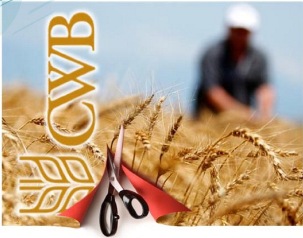 EXECUTIVE SUMMARY
EXECUTIVE SUMMARY
In this policy paper, Professor Boyd points out that the Canadian Wheat Board monopoly may be removed by 2012, and he looks ahead to resulting changes for farmers and industry, including the formation of a voluntary wheat board.
He explains that a main reason for the removal of the Board monopoly is that today’s farmers are larger, more independent, and more sophisticated, and that they want the freedom to make their own grain marketing decisions.
This is in contrast to over 70 years ago when the Board was put in place around the time of the great depression, and there were many smaller subsistence farmers who lacked grain marketing information and expertise. These smaller farmers were therefore relatively more comfortable with the Board marketing their grain, compared to many of today’s larger, independent, and sophisticated farmers.
He explains that there will likely be some voids left by the loss of the Board monopoly, including loss of some export customer relationships, at least in the short-term. As well, there may be voids left from the Board no longer serving as an advocate for farmers on grain issues, regulatory issues, transportation issues, and other issues.
Professor Boyd also points out that regulators will need to remain vigilant, in order to ensure that there is sufficient competition among the private grain companies, and within the grain transportation sector, in the absence of the Board monopoly. He mentions that the grain industry appears relatively competitive at present. However, if the industry becomes less competitive in future, and the voluntary board is unable to add sufficient competition, then this could bring rise to new grain cooperatives or other grain companies entering the industry.
Professor Boyd goes on to point out alternatives for the structure of a new voluntary wheat board, and some requirements it would need in order to be successful in the long-term, and some challenges it would likely face. He explains that more deregulation, new investment, innovation, and value added may occur in the absence of a Board monopoly would bring prosperity, and that this may add jobs to offset those jobs lost from removal of the Board monopoly. He also mentions that some jobs potentially lost from removal of the Board monopoly may be shifted to a voluntary board. Or, they could be absorbed by private grain companies taking on business formerly handled by the Board. Finally, he mentions that more grain may be traded on the ICE Futures Canada Exchange in Winnipeg, in the absence of a Board monopoly.
He concludes that the grain industry will continue to have cycles and ups and downs, and that farmers and the grain industry are resourceful and will adjust to changes. As world population and income continue to grow each year, world grain demand will steadily increase, and farmers and the grain industry will continue to prosper over the long-term. Farmer demographics will continue to change and farmers are likely to become larger, more independent, and more sophisticated. As a result, more Prairie farmers are likely to adjust sufficiently to a voluntary wheat board system and to the marketing of their own wheat, and many will prefer this, as they have already been marketing their own canola for many years with success.
View entire study as PDF (19 Pages)


